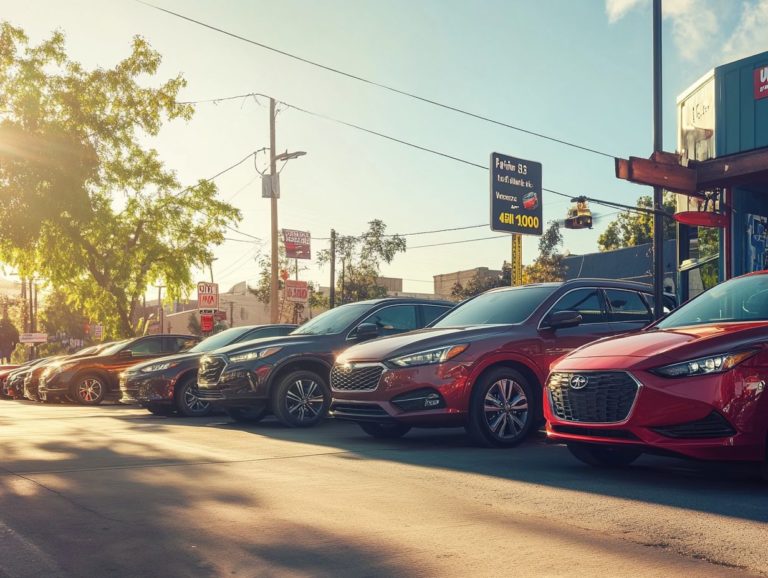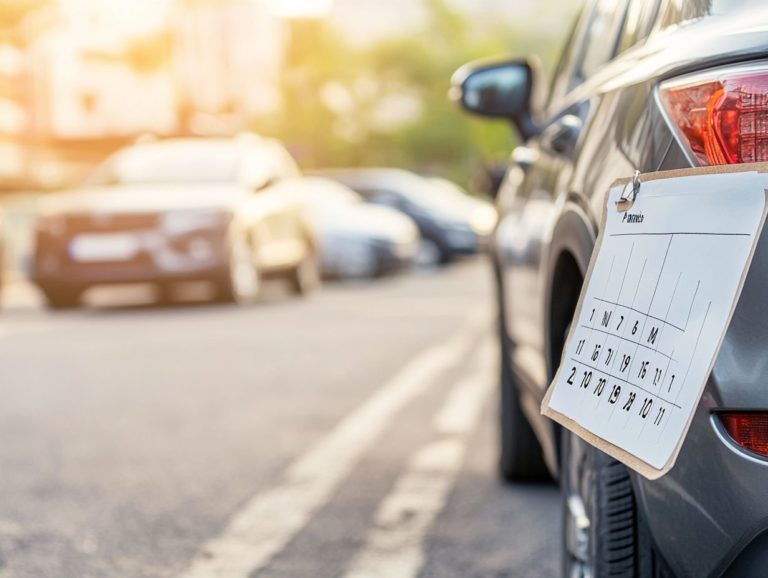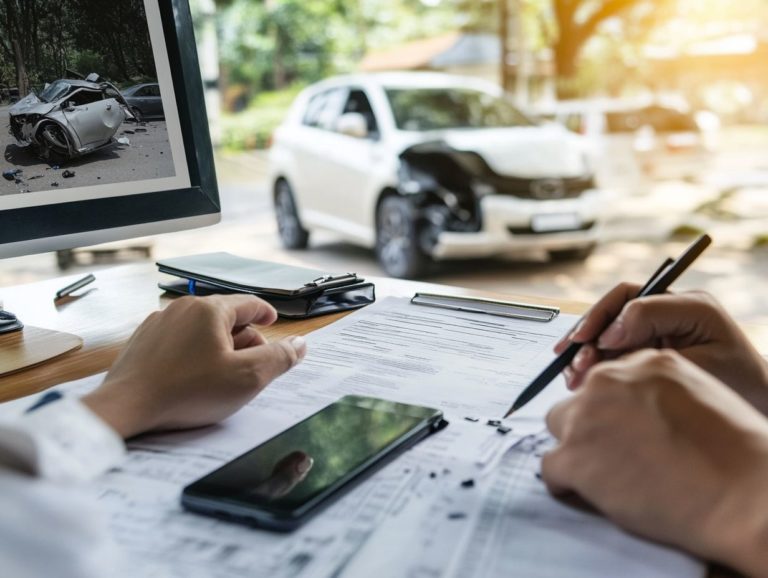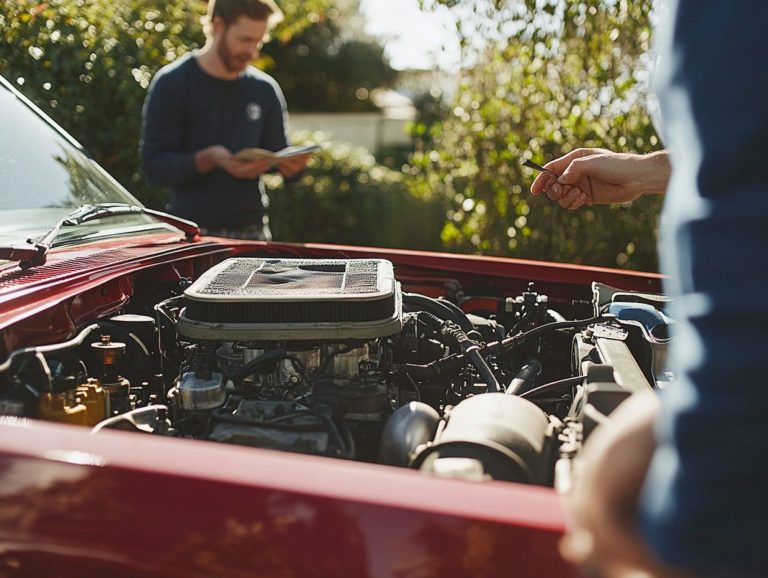5 Tips for Buying Used Cars at a Dealership
Buying a used car can be exciting but also overwhelming. Researching, budgeting, and negotiating a good deal are critical steps.
Get ready! Here are five essential tips to make your car-buying journey smooth and successful! You’ll also find insights into the pros and cons of buying from a dealership.
Keep reading to arm yourself with the must-know tools!
Contents
- Key Takeaways:
- 1. Do Your Research
- 2. Set a Budget and Stick to It
- 3. Take a Test Drive
- 4. Get a Vehicle History Report
- 5. Negotiate the Price
- What Are the Benefits of Buying a Used Car at a Dealership?
- Frequently Asked Questions
- What are the top 5 tips for buying used cars at a dealership?
- Should you buy a used car from a dealership or a private seller? Let’s find out!
- What should I look for when inspecting a used car at a dealership?
- Can I negotiate the price of a used car at a dealership?
- What should I do after buying a used car at a dealership?
- What are some red flags to watch out for when buying a used car at a dealership?
Key Takeaways:
- Do your research to find the right used car for your needs and budget.
- Set a budget and stick to it to avoid overspending.
- Take a test drive to ensure the car meets your expectations.
1. Do Your Research
Before buying a used car, it’s essential to do thorough research. Look at different vehicles, their specs, and reliability scores.
Websites like Consumer Reports can help. They provide detailed insights on car performance and owner experiences.
Check reliability ratings to see how well a vehicle performs over time. Consumer reviews reveal real-life experiences that may not be clear in technical specs.
This knowledge helps you compare models and make a decision that fits your needs and budget.
2. Set a Budget and Stick to It
Establishing a clear budget is crucial when shopping for used cars. This includes the total cost, covering base price, taxes, and fees.
Don’t forget ongoing costs like maintenance and insurance. These can greatly affect overall affordability.
Understanding financing terms is essential for a long-term commitment that fits your budget. Prioritize buyer protection rules during negotiations to avoid hidden costs.
3. Take a Test Drive
A test drive is vital when buying a used car. It allows you to experience the vehicle s comfort and performance firsthand.
Pay attention to how the car handles on different roads. Assess its braking performance for safety, and think about comfort features like seat support and cabin noise levels.
Also, compare different models to find the best fit for you. This helps identify differences in drive quality and fuel efficiency.
4. Get a Vehicle History Report

Obtaining a vehicle history report is an essential step in your used car buying journey. It grants you vital insights into previous accidents, service history, and ownership that can significantly influence the vehicle’s reliability and value.
To kick things off, find the Vehicle Identification Number (VIN), a unique code that identifies your car. This number is typically located on the dashboard or inside the driver s side door.
Once you have that number, enter it into online databases or services to access comprehensive reports. These reports will detail any reported accidents, maintenance records, and the number of previous owners.
A thorough examination of these details can unveil patterns that indicate whether the car has been well cared for or if it might come with a host of issues. This documentation empowers you to make informed decisions. It also protects you from unexpected repair costs down the line, ensuring peace of mind as you invest in a used vehicle.
5. Negotiate the Price
Negotiating the price is a crucial step in your used car purchasing journey. By using good negotiation skills, you can secure the best deal possible, whether you re engaging with private sellers or dealerships.
Always remember to factor in the out-the-door price, which refers to the total cost you pay, including fees and taxes.
One powerful strategy is to conduct thorough research beforehand. Understanding the vehicle’s condition, its history report, and the market value will arm you with vital information that can serve as leverage in negotiations.
For example, if your research reveals that similar models in your area are priced lower, you can present that as a compelling argument during discussions. When negotiating with private sellers, showcasing your knowledge about the car s maintenance records can encourage them to reconsider.
In a dealership context, focusing on the vehicle s condition and referencing comparable listings can help you negotiate more effectively. This approach will increase your chances of walking away with a deal that leaves you feeling satisfied and confident in your choice.
What Are the Benefits of Buying a Used Car at a Dealership?
Buying a used car at a dealership comes with great perks! You gain access to warranties, flexible financing options, and professional inspections that offer peace of mind throughout the purchasing journey. However, if you’re considering a private sale, it’s wise to check out these 5 tips for buying a used car from a private seller to ensure a smooth transaction.
Dealerships provide comprehensive consumer protection, enhancing the transparency and trustworthiness of the entire buying experience. This includes guarantees against hidden defects and the option to return the vehicle within a specified period if it doesn’t align with your expectations.
The financing options available at dealerships usually feature competitive rates, making it easier for you to budget effectively. Plus, the ability to negotiate prices gives you the power to secure a deal that truly fits your financial situation.
The thorough inspections carried out by professionals guarantee that the vehicle meets safety and quality standards, significantly reducing the likelihood of unforeseen issues cropping up shortly after your purchase.
What Are the Risks of Buying a Used Car at a Dealership?
Buying a used car at a dealership can present a wealth of benefits, but it also comes with its share of risks. You might encounter potential scams, misleading paperwork, and contracts that don’t quite favor you, making it vital to stay vigilant and informed. Following 5 tips for buying a used luxury car can help you navigate these challenges effectively.
Be aware that dealerships often hide fees that can significantly inflate the total cost, including documentation fees, dealer prep fees, and charges for services that weren t clearly communicated during negotiations. It s essential for you to meticulously examine all paperwork and grasp every term before you commit your signature.
To identify red flags, keep an eye out for:
- Vague language within contracts
- Pressure tactics from sales staff
- Discrepancies between what was verbally agreed upon and what s actually in writing
By adopting a methodical approach, such as preparing for buying a used car by asking for clarification on ambiguous terms and comparing offers from different dealerships, you can secure a fair deal and minimize the risk of falling prey to less-than-honest practices.
What Questions Should You Ask the Dealer?
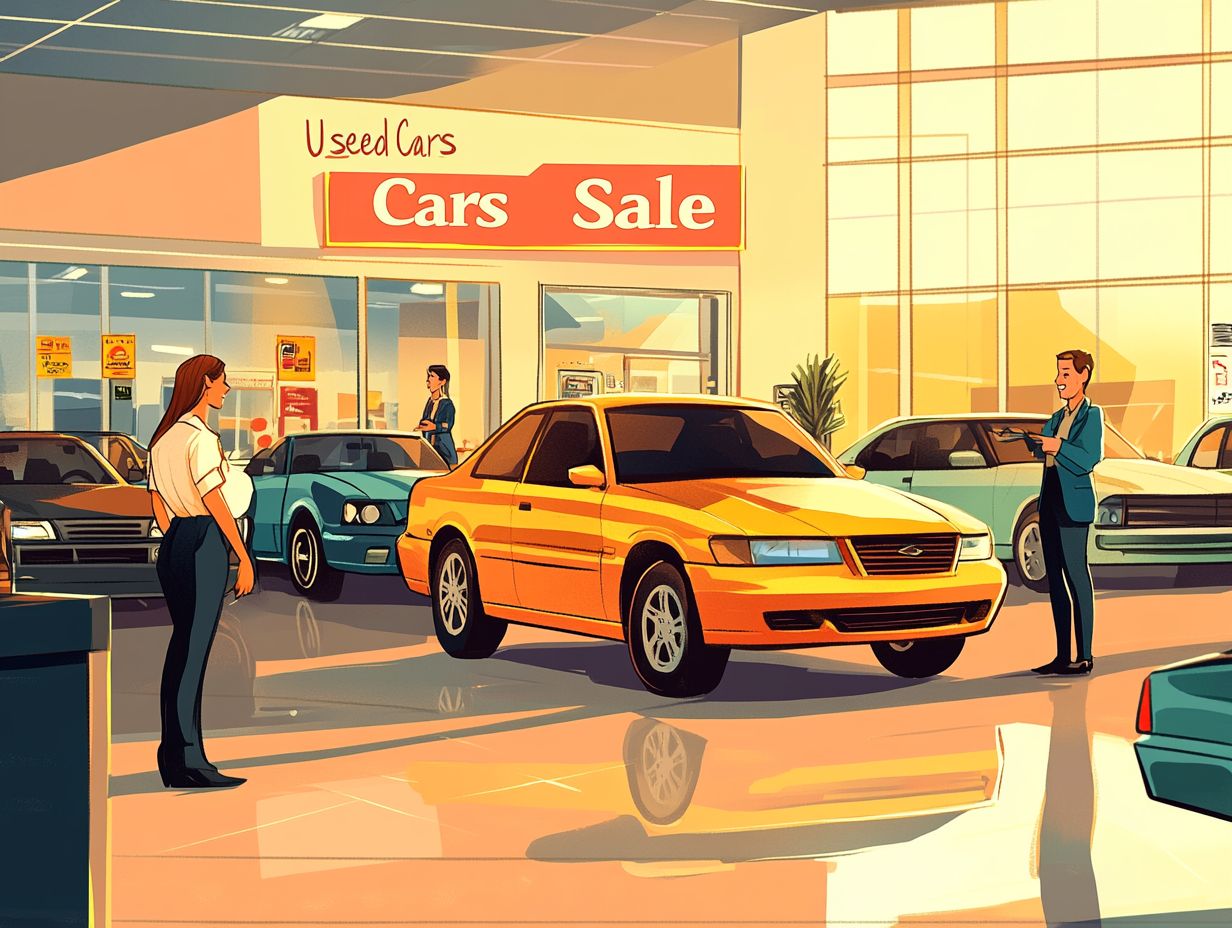
Asking the right questions when you’re dealing with a dealer is essential for ensuring a seamless used car purchase. Covering topics like the vehicle’s history, inspections performed, and the intricacies of what to expect from a used car dealer is key.
Moreover, you should definitely inquire about any previous accidents the vehicle may have had, as this can greatly affect its overall condition and resale value. Understanding the maintenance records will give you valuable insight into how well the car has been cared for over the years.
Clarity about warranty coverage is vital; make sure to ask precisely what is included and how long it remains valid. Ensuring transparency in these areas not only gives the power to you as a buyer but also reinforces your rights as a consumer. This makes the entire process feel more confident and secure.
How Can You Ensure You’re Getting a Good Deal?
To secure a favorable deal on a used car, conduct thorough inspections and employ effective negotiation strategies. For those considering a new purchase, it’s also wise to review 5 tips for first-time new car buyers and cross-check prices against reliability ratings and consumer reviews.
Compare prices with similar makes and models in your local market to gain a clearer understanding of the vehicle’s true value. It’s equally important to review the car s history report to uncover any hidden issues, such as past accidents or title problems.
This diligence goes hand-in-hand with assessing the vehicle’s condition, so consider having a trusted mechanic look at the car before you buy it for any potential mechanical problems. Diving into reviews from previous owners can offer you invaluable insights into the car’s performance and reliability.
Being meticulous at every step can significantly enhance your overall purchase experience!
What Are the Most Important Factors to Consider When Buying a Used Car?
When you re in the market for a used car, consider several key factors: the vehicle’s condition, service history, mileage, and features. All of these play a crucial role in determining reliability ratings and overall value.
A well-maintained vehicle with a documented service history often signals a strong commitment to upkeep. This makes it particularly appealing to potential buyers like yourself. Coupled with the mileage, this is essential in assessing how much life remains in the car.
While lower mileage generally indicates less wear and tear, don t overlook a higher-mileage vehicle that has been meticulously serviced; it could actually be the better option. Reliability ratings provide valuable insights into how a particular make and model performs over time, steering you toward choices that will meet your needs with fewer unexpected repairs.
Ultimately, these interconnected factors paint a clearer picture of a vehicle’s value and its suitability for your everyday use.
How Can You Avoid Being Scammed at a Dealership?
To steer clear of scams at a dealership, it’s vital for you to familiarize yourself with your consumer protection rights. Additionally, following tips for finding the best lease deals can help ensure you make informed decisions. Take the time to thoroughly inspect the vehicle and carefully check all paperwork before you sign any contracts.
By doing this, you give the power to yourself to make informed decisions. It s essential to verify the vehicle’s history using services that provide accident reports and ownership records. This can uncover any hidden issues that might not be immediately obvious.
Arranging for a pre-purchase inspection by a trusted mechanic adds an extra layer of security, ensuring that the vehicle is in good condition. Understanding your consumer rights will facilitate informed discussions and enable you to challenge any misleading practices.
In more complex situations, seeking legal advice is wise. This allows you to navigate the intricacies of the transaction effectively.
Frequently Asked Questions
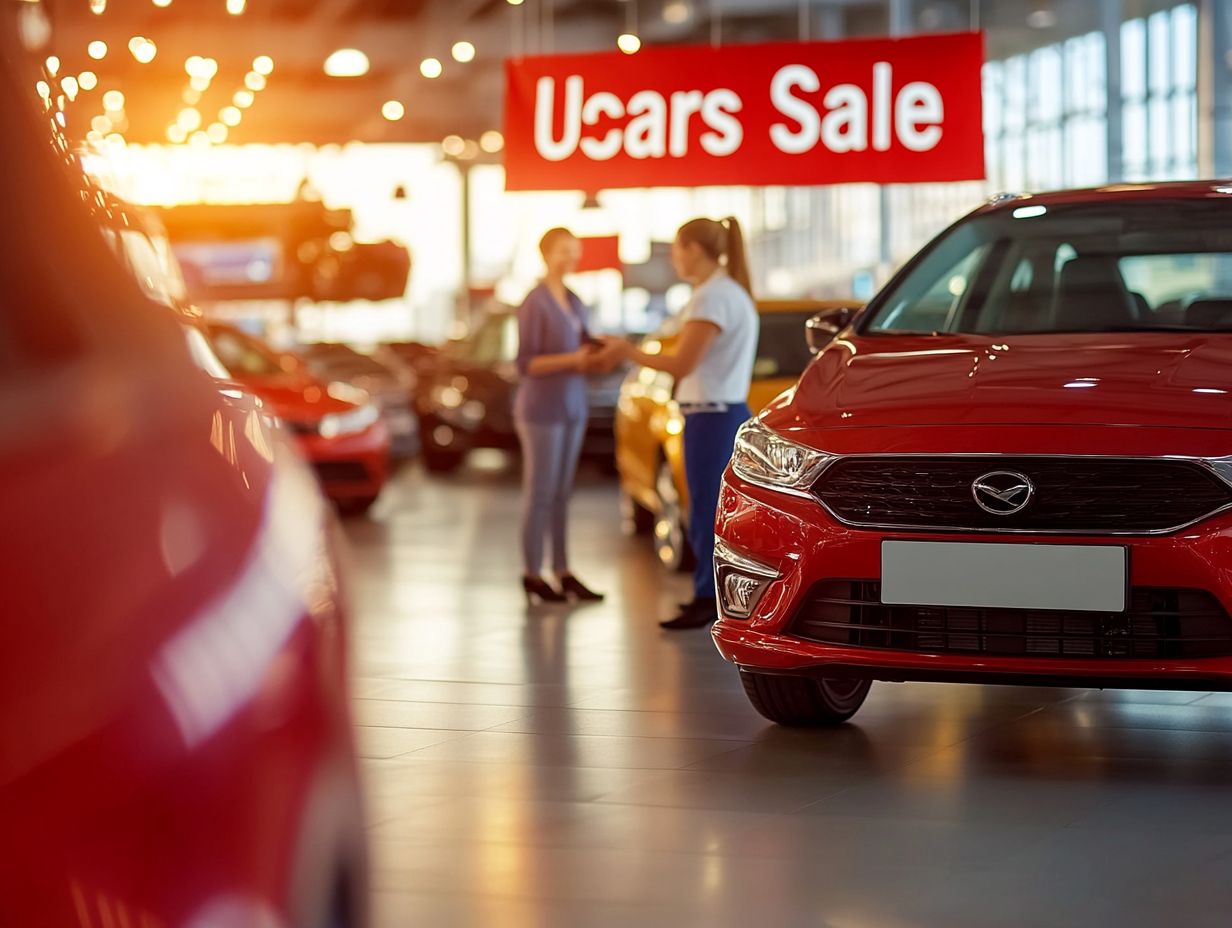
Don t wait get informed and make confident choices today!
What are the top 5 tips for buying used cars at a dealership?
1. Start with your research! Knowing the market value of the car can save you money. Look into the make and model you want, and check for common issues.
2. Get a vehicle history report. This document tells you about the car’s past, including accidents, ownership history, and maintenance records.
3. Always take the car for a test drive. This helps you understand its performance, handling, and overall condition.
4. Feel empowered to negotiate the price! Use your research and the car’s condition to get a better deal.
5. Have a trusted mechanic inspect the car before you decide. This ensures there are no major issues hiding beneath the surface, and it can help you follow tips for finding honest used car sellers.
Should you buy a used car from a dealership or a private seller? Let’s find out!
Both options have their pros and cons. Dealerships usually have a larger selection and financing options. Private sellers might offer lower prices. It all depends on your preferences and budget.
What should I look for when inspecting a used car at a dealership?
When inspecting a used car, check its overall condition and mileage. Look for visible signs of damage or wear.
Pay attention to the tires, brakes, and engine. Test driving the car is also crucial. Having a mechanic inspect it is highly recommended.
Can I negotiate the price of a used car at a dealership?
Yes! You can and should negotiate the price. Use your research and the vehicle’s condition to your advantage. If the dealership won’t budge, don’t hesitate to walk away.
What should I do after buying a used car at a dealership?
After your purchase, transfer the title and registration into your name. Consider getting the car inspected and completing any necessary repairs.
Keep up with regular maintenance to ensure the car stays in tip-top shape.
What are some red flags to watch out for when buying a used car at a dealership?
Be cautious of dealerships that won’t provide a vehicle history report or pressure you into a quick sale. For more information on how to choose wisely, check out these tips for evaluating car dealerships. Avoid cars with high mileage, visible damage, or a history of accidents.
Happy car shopping! Take your time and enjoy the process!

